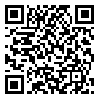BibTeX | RIS | EndNote | Medlars | ProCite | Reference Manager | RefWorks
Send citation to:
URL: http://jmed.ssu.ac.ir/article-1-68-en.html
Introduction : Regarding the numerous benefits of e-learning, an investigation of its barrier and potential solutions to resolve them will be helpful. This will enable universities to implement this method and convert their traditional teaching-learning methods and approaches to e-learning.
Methods: In this descriptive study a total of 242 faculty members at Tabriz University of Medical Sciences were selected randomly. A questionnaire was used to collect data on their attitudes towards barriers of e-Learning. The data were analyzed using SPSS15.
Results: The barriers were classified into six categories and twenty-four cases. The average score of the administrative category was 13.18±1.96, electronic categories was 11.66±2.32, educational category was 13.39±2.22, economical category was 9.62±2.09, cultural and psychological categories was 20.43±2.53, and finally, social and cooperative category was 10.09±1.97. The cultural and psychological categories were found as the most important barrier and the electronic category the least important one.
Conclusion: The academics believed that they did not have enough time or skills for compiling and evaluating e-learning materials and that there was no proper culture for this. Not only the academics should learn how to compile, use and to take rapid feedback, but also it is essential that they recognize their new roles (as learning facilitators) in realizing and expanding their mode of education by their innovations.
| Rights and permissions | |
 |
This work is licensed under a Creative Commons Attribution-NonCommercial 4.0 International License. |





